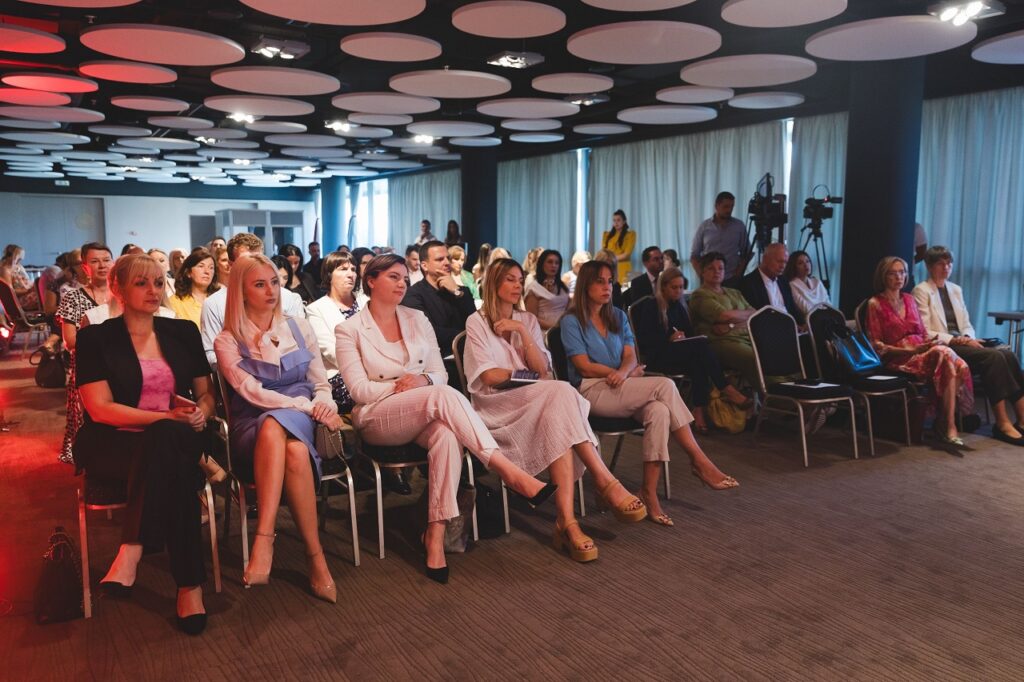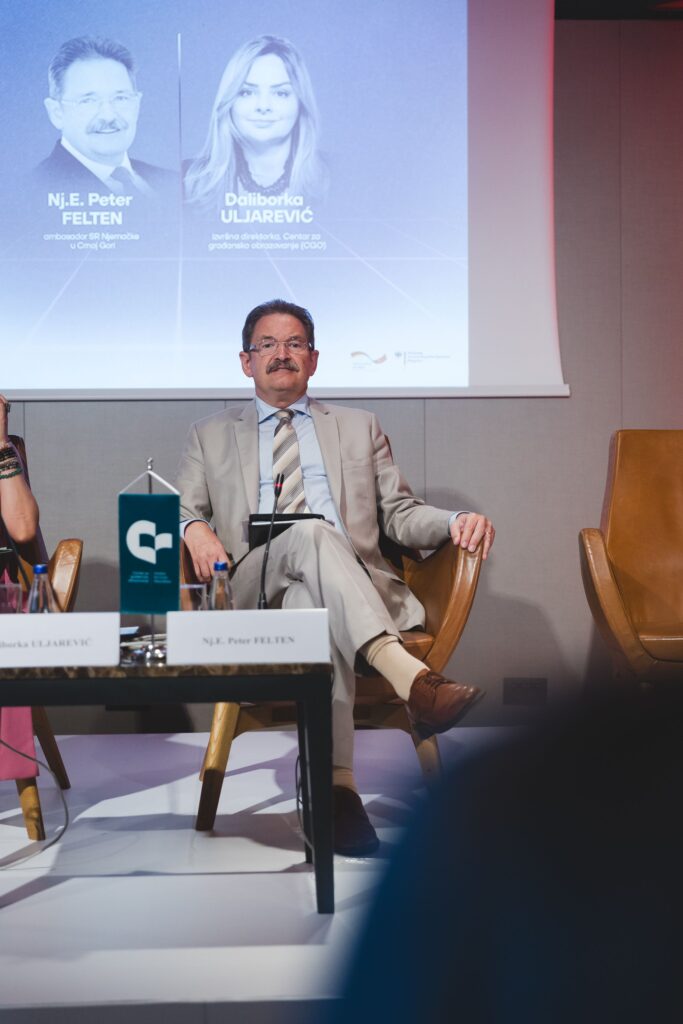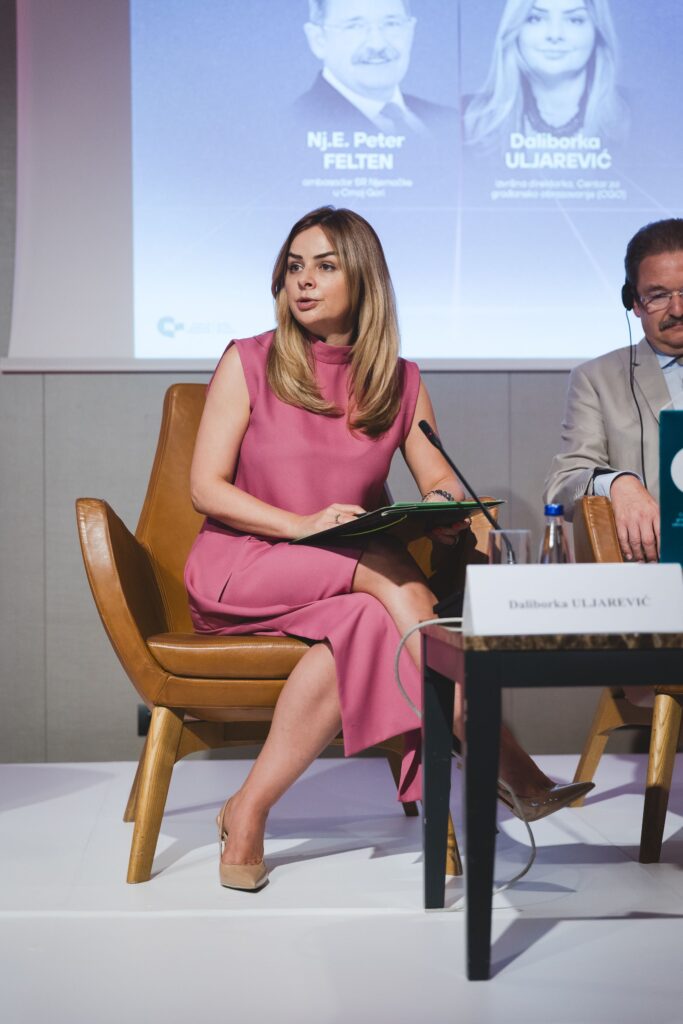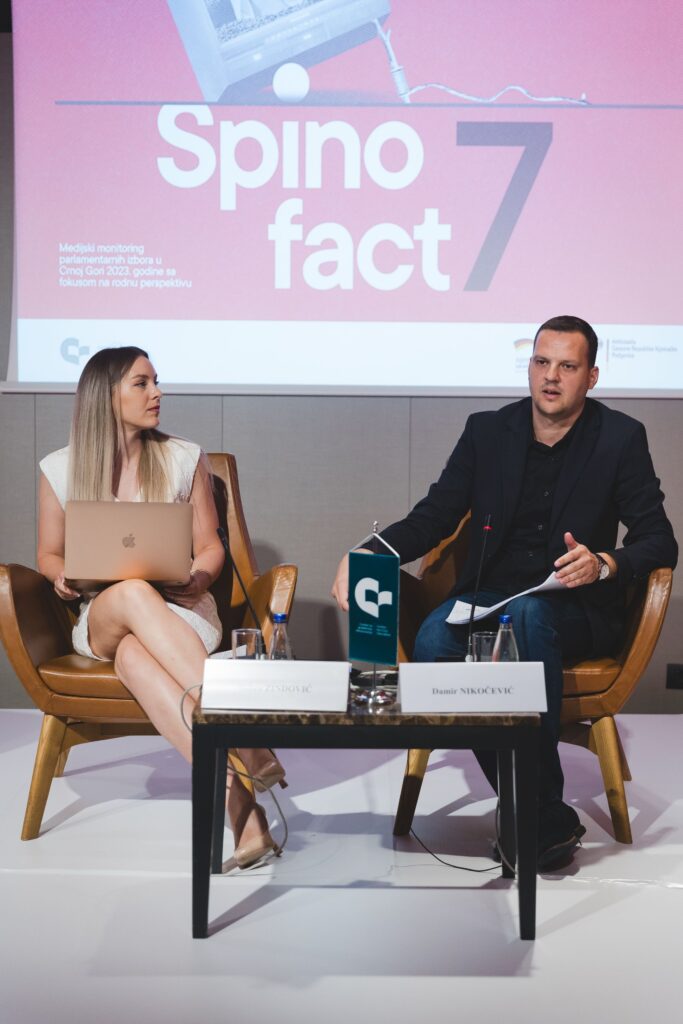The price that women pay for high positions is higher than the price men pay, and this was evident during the campaign for parliamentary elections, as indicated by the findings of media monitoring and other aspects, was concluded, among other, during the first part of the conference “Gender Equality and Media in the Election Campaign,” organized by the Centre for Civic Education (CCE), with the support of the Government of the Federal Republic of Germany.
H.E. Peter Felten, the Ambassador of the FR of Germany to Montenegro, stated that in Montenegro, women hold certain key positions – President of the Parliament, Vice President of the Parliament, acting President of the Supreme Court, acting State Supreme Prosecutor, half of the judges in the Constitutional Court, as well as the Mayor and President of the Capital City Parliament… However, he also pointed out that this does not paint a complete picture and that women are not sufficiently represented in leadership positions in Montenegro, which is a broader, global problem. “Very few women will represent the citizens after these parliamentary elections, as we can see from the announced constitutive composition of the Parliament. It should be emphasized that the price women pay for high positions is higher than what men pay. As someone who has worked within the Ministry of Foreign Affairs in the field of human rights protection, I emphasize that all beings have equal rights that need to be respected, protected, promoted, and fulfilled, and this is primarily the responsibility of the state,” said Felten. He highlighted the importance of women’s inclusion in all fields, explaining that they can contribute significantly to society, and that no society should lose or reject that contribution. “The loss of any society occurs when women provide only a portion of what they are capable of, constrained by limitations because societies in which women contribute to social, economic, and political life are much nobler. Therefore, equal enjoyment of rights is beneficial for all,” emphasized Felten. He believes that for achievement of greater engagement of women, there must be more investment in education based not only on facts but also on values and rights. “Germany has adopted a feminist foreign policy, which may sound dangerous to some as a phrase, but it aims at the simple goal – genuine work from a gender perspective. Although we have more women in leadership positions, issues of job division that were relevant in the past and related to gender still need to be further systematically addressed,” concluded Felten.
Daliborka Uljarević, Executive Director of the CCE, emphasized that issues of gender equality remained on the margins in this election campaign, both in electoral manifestos and in the narrative of electoral lists, and that the percentage of women on the lists mostly hovered around the legal minimum. She also pointed out that media monitoring confirmed a strong division in the Montenegrin media scene, with noticeably biased instead of balanced reporting. “Gender equality is a fundamental principle of modern society, and the electoral process and media play a crucial role in promoting it. It is important to work towards a stimulating environment in which women’s voices are heard louder and clearer, and where there are no ‘glass ceilings’ for women’s political participation. In this context, gender-sensitive stereotypes must be constantly combated, especially within political parties and electoral processes, as this is the space that significantly enables or hinders equal representation of women and men in decision-making positions. Quotas are not enough, and this is evident in the new composition of the Parliament, which will have only 21% of women in the constitutive session,” said Uljarević. She stressed the importance of continuous education and capacity building for various actors to change awareness concerning this issue. “Eliminating offensive and discriminatory language through media reporting is imperative. Montenegro must be a society of equal opportunities, and those who restrict it must be identified as such – through calling out, public shaming, and processing wherever elements for that exist,” Uljarević stated.
The general characteristics of the pre-election campaign included an extremely high number of media posts (9861 posts), which is in line with a large number of electoral lists, the dominant themes were corruption, crime, rule of law, followed by general political issues and those related to the economy, however, the issue of gender equality was poorly represented. The second part of the campaign had a negative or attacking character, these are some of the key findings of the media monitoring of the 2023 parliamentary elections presented today, which included qualitative and quantitative research in the period from 11 May to 9 June 2023. The monitoring covered 10 television (TVCG, TV Vijesti, Nova M, Prva TV, Adria TV, Gradska TV, TV E, TV 7, TV A+, PINK M), 3 daily papers (Dan, Vijesti, Pobjeda), and 12 online portals (Vijesti, CdM, Analitika, RTCG, Antena M, IN4S, Standard, Gradski, Borba, Dan, Pobjeda, Aktuelno), with the professional support of the Arhimed agency.
Damir Nikočević, the Development coordinator at the CCE, highlighted that the majority of posts were on online portals – 80%, while among television stations, TV Vijesti was at the top, and among print media it was Dan, whereas among the online portals Gradski. me had the highest number of posts.
The monitoring team conducted a specific analysis of the area of women’s participation in politics, women’s rights, political and economic empowerment of women, and violence against women, which, as mentioned by Milica Zindović, Programme associate at the CCE, poorly represented. “Gender equality issues in the campaign for these parliamentary elections were at the margins, with only 2% of announcements related to gender equality. Moreover, in that small overall narrative, only 3% of media announcements during the campaign for the 2023 parliamentary elections created a positive image of women,” Zindović emphasized, adding that the male voice in media posts was more than 6 times prevalent than the female voice. “The male voice appears dominantly in 64% of posts compared to 11% where the female voice dominates,” said Zindović.
During the campaign for the parliamentary elections, a total of 655 individual billboards from 21 municipalities were analyzed. The list “Aleksa and Dritan – Courage counts” had the highest number of billboards – 27.3% or 179 billboards, followed by “Together for the future that belongs to you – Danijel Živković” with 20.3% or 132 billboards, whereas the Movement Europe now is at the third place with 17.4% or 114 billboards. In this part of the analysis, even 81.4% of billboards did not feature any female figure.
“The research also covered 220 political commercials during the sampled period. In 56.4% of the commercials, women were present without a voice, and their roles were often stereotypical – women talked about motherhood, while men discussed diplomacy and development. However, a counterexample would be the commercials of the coalition We Can in which women are shown in engineering and traditionally male roles,” stated Zindović.
The most frequently mentioned lists in the media were the DPS coalition – 3222, the Movement Europe now – 2691, and the Movement URA – 1972, while parties representing minorities had the lowest representation in the media. “The obtained data indicate what was observed during the pre-election campaign, namely the fact that the main political polemic took place among a few political subjects, i.e., that the so-called negative campaign was mostly present in the media appearances of several leading political subjects (DPS coalition, Movement Europe now coalition, former DF, Movement Ura, Democrats…). Also, the general impression is that the DPS is no longer the only political party facing negative criticism from other political subjects, as there are more such political subjects, primarily Movement Europe now, which was exposed to pronounced negative campaigning (both generally and related to the ‘Do Kvon’ case),” explained Nikočević.
The CCE monitoring team noted only about 1% of the tracked content on social media that focused on gender equality issues during the campaign for parliamentary elections. “Compared to earlier periods, there were fewer misogynistic comments, which can be attributed to the fact that only one woman was the list leader, and that women, in general, were not the leading faces of the campaigns. Also, a significant number of positive comments were recorded under posts on social media, indicating a gradual maturation and increased understanding of the general public about the necessity of promoting women’s political participation. Looking at social networks separately, on Facebook these issues were communicated the most by We Can, Boris Mugoša, BP, SD, MfC, PPS, Forca, Nik Đeljošaj, DPS, Demos, CM URA, on Instagram We Can, PPS, DPS, SD, CM URA, BP, Albanian Forum, Albanian Alliance, while on Twitter DPS, SD, BP, LP were the most active concerning topics”, said Zindović.
The conference continued with the panel “Women and Media through the Prism of the 2023 Parliamentary Elections,” where representatives from the strongest parliamentary subjects, media, and NGOs participated.
The conference “Gender Equality and Media in the Election Campaign”, which gathered nearly 60 participants, is a part of the project “SPINoFACT 7 – Media Monitoring of the 2023 Parliamentary Elections in Montenegro with a Focus on Gender Perspective,” which the CCE implements with the support of the Government of the Federal Republic of Germany.
Maja Marinović, programme associate




